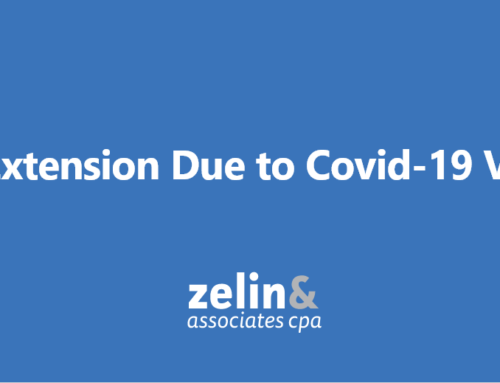Recommendations for Tax Season from The Singing CPA®
New York, NY, January 14, 2019 — The Internal Revenue Service (IRS) officially accepts tax returns on January 28th. Steven B. Zelin, CPA, Managing Member at Zelin & Associates CPA LLC, also known as The Singing CPA®, has some recommendations.
Watch your withholdings
Tax reform caused the amount of money withheld from paychecks to go down in 2018 for many taxpayers. That made their paychecks bigger, but it could result in smaller refund checks for many, and some might even end up owing tax when they file their tax returns.
The IRS has a tool on their website to assess whether your withholding is correct. If it’s not, you can make adjustments to your payroll withholding by filing a new Form W-4 with your employer. Estimated tax payments can prevent you from owing penalties and interest.
Predict what your refund will be
The biggest motivator for many to file their returns is their refund. Tax reform will likely affect those refund amounts in many ways. Higher standard deductions, lower tax rates, and larger child tax credits could boost refunds, while the elimination of personal exemptions, limitations on certain itemized deductions, and the phase-out of various other tax benefits could reduce them.
One thing families should remember is that if you’re eligible for the earned income credit or the additional child tax credit, your refund will be delayed at least until mid-February. Given the potential for delays to the beginning of tax season, it’s likely that even those who aren’t seeking those credits could have to wait at least that long to get money back from the IRS.
Look at these special rules for those without Social Security numbers
If you’re required to file taxes but don’t have a Social Security number and aren’t eligible to get one, then the IRS issues what it calls individual taxpayer identification numbers (ITINs). These are the same as a Social Security number for tax purposes for certain nonresident aliens, as well as a set of resident aliens and dependents or spouses.
The critical thing about ITINs is that they expire. Those whose ITINs are due to expire should submit a renewal application now in order to avoid any future hassles.
Familiarize yourself with new tax forms
Millions of taxpayers will have to deal with a new tax form for the very first time during the 2019 tax season. Everyone will use a shortened version of Form 1040 which more closely resembles short-form returns like the 1040-EZ and 1040A. This 1040 will also require new schedules that taxpayers will have to attach in certain circumstances. The new forms are available on the IRS website.
Know where to get help
The IRS knows that tax reform will create a lot of confusion. Check with a CPA or other accountant for help in filing.
Be ready for tax season
Preparing your tax return might seem daunting this year, especially with all the changes that have occurred lately, but with the prospect of possible tax savings, you have a big incentive.
New tax credits may apply to you
Identifying which tax credits apply to you can be a big help as you prepare to file your income tax return. Here are the 5 biggest tax credits you might qualify for.
A number of federal tax credits exist to help taxpayers—primarily those in middle-income and low-income households—retain more of their earnings. Identifying which credits apply to you will reduce your pain as you prepare to file your income tax return.
“These credits are primarily for low-to-moderate-income earners. At an income of $30,000 to $50,000 a year, an individual’s chances of qualifying for credits can drop significantly,” said Mr. Zelin. “Unless these filers’ itemized deductions exceed the standard deduction, they may find themselves in an uncomfortable gray zone of the tax code. In many cases, ineligibility for tax credits could mean the loss of $3,000 to $4,000 at tax season.”
- Earned Income Tax Credit: One of the most substantial credits for taxpayers is the Earned Income Tax Credit (EITC). Established in 1975—in part to offset the burden of Social Security taxes and to provide an incentive to work—the EITC is determined by income and is phased in according to filing status: single, married filing jointly or either of those with children. Eligibility and the amount of the credit are based on adjusted gross income, earned income and investment income. A person must be at least 25 years old and younger than 65 to qualify. If married, both spouses must have valid Social Security numbers and must have lived in the country for more than six months. If you may be claimed as a dependent on another filer’s tax return, you do not qualify. Those Married Filing Separately do not qualify for the EITC.
- American Opportunity Tax Credit: For years, the Hope Credit helped families pay the costs of higher education. Since 2009, that credit has been rebranded and expanded as the American Opportunity Tax Credit (AOTC). Under the Hope Credit, taxpayers received a credit for only two years of undergraduate tuition. The AOTC covers four years of post-secondary education. The AOTC also broadens the range of taxpayers who may receive it by increasing the maximum income level. The full credit is available to people whose modified adjusted gross income is $80,000 or less, or $160,000 or less for married couples filing jointly. These income limits are higher than those for another education credit, the Lifetime Learning Credit.
Depending on your income (the credit drops as income increases), you may receive up to $2,500 of the cost of qualified tuition and course materials paid during the taxable year. The student must be enrolled at least half-time for at least one academic period. This credit is available on a per-student basis.
- Lifetime Learning Credit: This credit was established to offset the costs of post-secondary education, differs from the American Opportunity Tax Credit in that it is available for any years of post-secondary education, not just the first four. Also, the credit is available for people not pursuing a degree. The Lifetime Learning Credit may be as high as $2,000 per eligible student. For 2018 the full credit is available to eligible individual taxpayers who make $57,000 or less, or married couples filing jointly who make $114,000 or less. The credit phases out as income goes beyond these amounts.
- Child and Dependent Care Credit: This credit helps to defray costs of babysitting or daycare. It’s available to people who must to pay for childcare for dependents under age 13 in order to work or look for work. The credit is also available for the cost of caring for a spouse or a dependent of any age who is physically or mentally incapable of self-care. Filing status must be single, married filing jointly, head of household or qualifying widow or widower with a qualifying child. The credit provides up to 35 percent of qualifying expenses, depending on adjusted gross income up to $3,000 of expenses paid for one Qualifying Person or up to $6,000 paid for two or more Qualifying Persons.
- Savers Tax Credit: The Savers Tax Credit, formerly the Retirement Savings Contributions Credit, is for eligible contributions to retirement plans such as qualified investment retirement accounts, 401(k) s and certain other retirement plans. Taxpayers with the least income qualify for the greatest credit—up to $1,000 for those filing as single, or $2,000 if filing jointly. For 2018, the maximum income for the Savers Tax Credit is $31,500 for single filers, $47,250 for heads of household, and $63,000 for those married and filing jointly. Filers must be at least 18 years old and may not have been a full-time student during the calendar year or claimed as a dependent on another person’s return.
Steven B. Zelin, CPA, The Singing CPA®, has produced several accounting related CDs including two that are tax related — The Singing CPA and No Accounting For the Holidays.
Mr. Zelin may be reached directly for further information at 646-678-4496 or Steven.zelin@zelincpa.com
# # #
1/14/2019




Leave A Comment